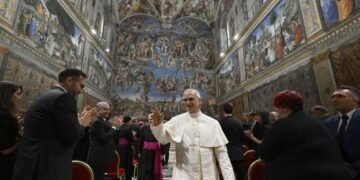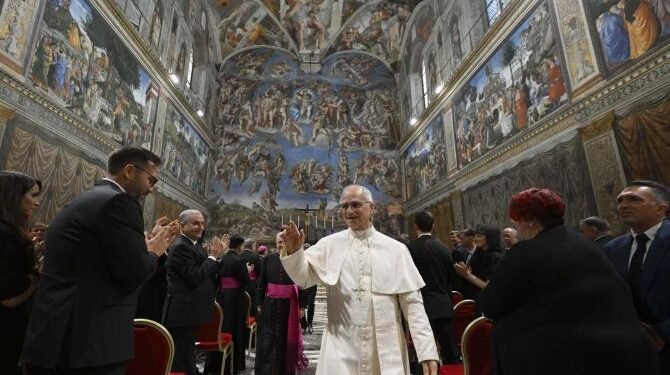By Charles Igwe
Pope Leo XIV paid a moving tribute to Blessed Cardinal Iuliu Hossu, the Romanian Greek Catholic bishop remembered for his heroic witness during the communist persecution and for saving thousands of Jews during World War II. The commemoration, held in the Sistine Chapel on Monday, marked 55 years since the cardinal’s death on May 28, 1970, and took place during what the Holy Father has declared a jubilee year dedicated to hope.
“We have gathered today in the Sistine Chapel to commemorate, in the jubilee year dedicated to hope, an apostle of hope: Blessed Cardinal Iuliu Hossu, Greek Catholic bishop of Cluj-Gherla,” the Pope began, highlighting the bishop’s unyielding faith and tireless commitment to truth and justice in times of profound darkness.
Pope Leo recalled that Hossu was appointed a cardinal in pectore—in secret—by Pope St. Paul VI in 1969, while he was still imprisoned for his loyalty to the Church of Rome under Romania’s communist regime. His appointment was only made public in 1973, three years after his death. This hidden elevation to the cardinalate, the Pope noted, was symbolic of the silence and suffering endured by the faithful under oppressive regimes, and of Hossu’s profound humility and dedication to Christ.
What made the commemoration particularly poignant this year was the renewed focus on Cardinal Hossu’s role as a “symbol of fraternity that transcends any ethnic or religious boundaries.” The Pope underscored the ongoing process for Hossu’s recognition as “Righteous Among the Nations,” the honor awarded by Israel to non-Jews who risked their lives to save Jews during the Holocaust. Hossu’s inclusion in this process stems from his brave and compassionate efforts between 1940 and 1944, during which he helped rescue thousands of Jews from Nazi extermination in Northern Transylvania.
Pope Leo read a stirring excerpt from a 1944 pastoral letter by Hossu, which captures the urgency and moral clarity that defined his ministry: “Our appeal is addressed to all of you, venerable brothers and beloved children, to help the Jews not only with your thoughts but also with your sacrifice, aware that today we can accomplish no nobler work than this Christian and Romanian aid, born of ardent human charity. The first concern of the present moment must be this work of relief.”
These words, the Pope said, are as relevant today as they were then. “Cardinal Hossu, between 1940 and 1944, contributed to saving thousands of Jews from death in Northern Transylvania,” he affirmed. “The hope of the great shepherd was that of the faithful man, who knows that the gates of evil will not prevail against the work of God.”







































